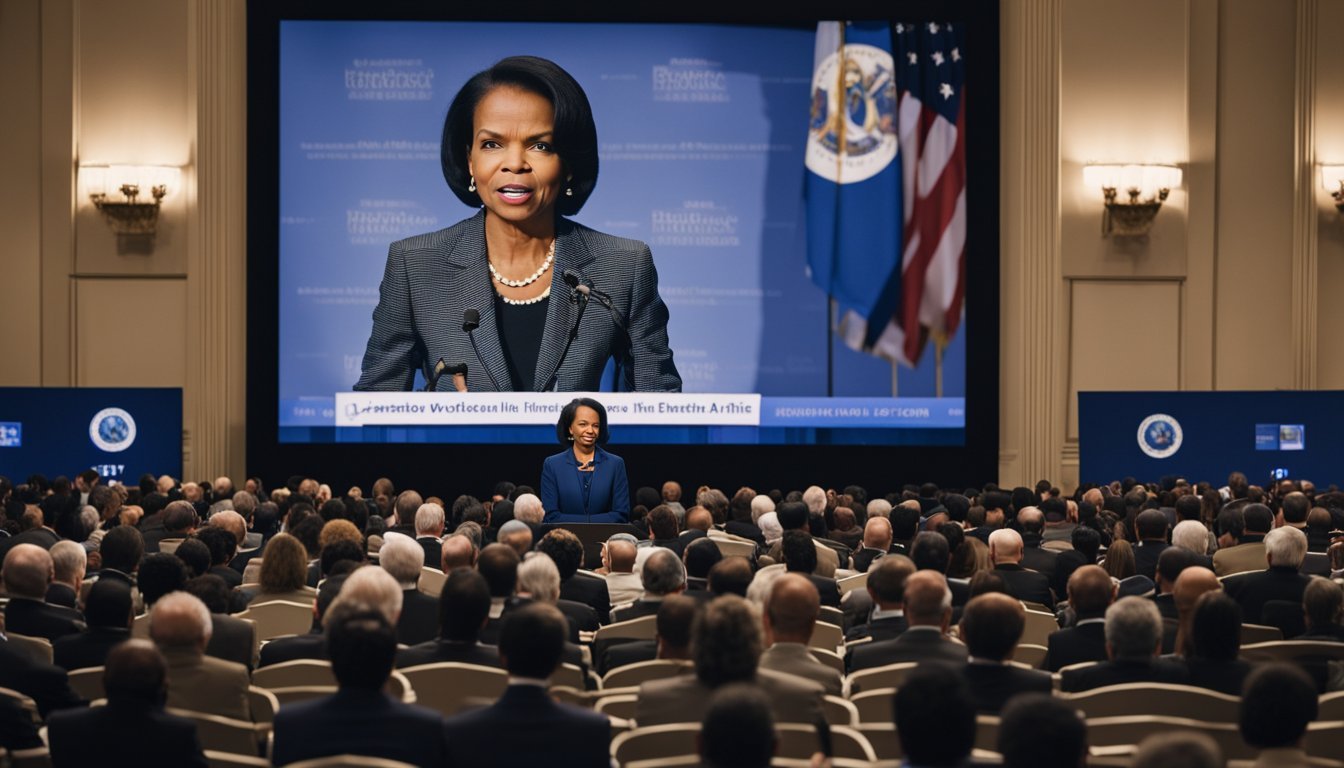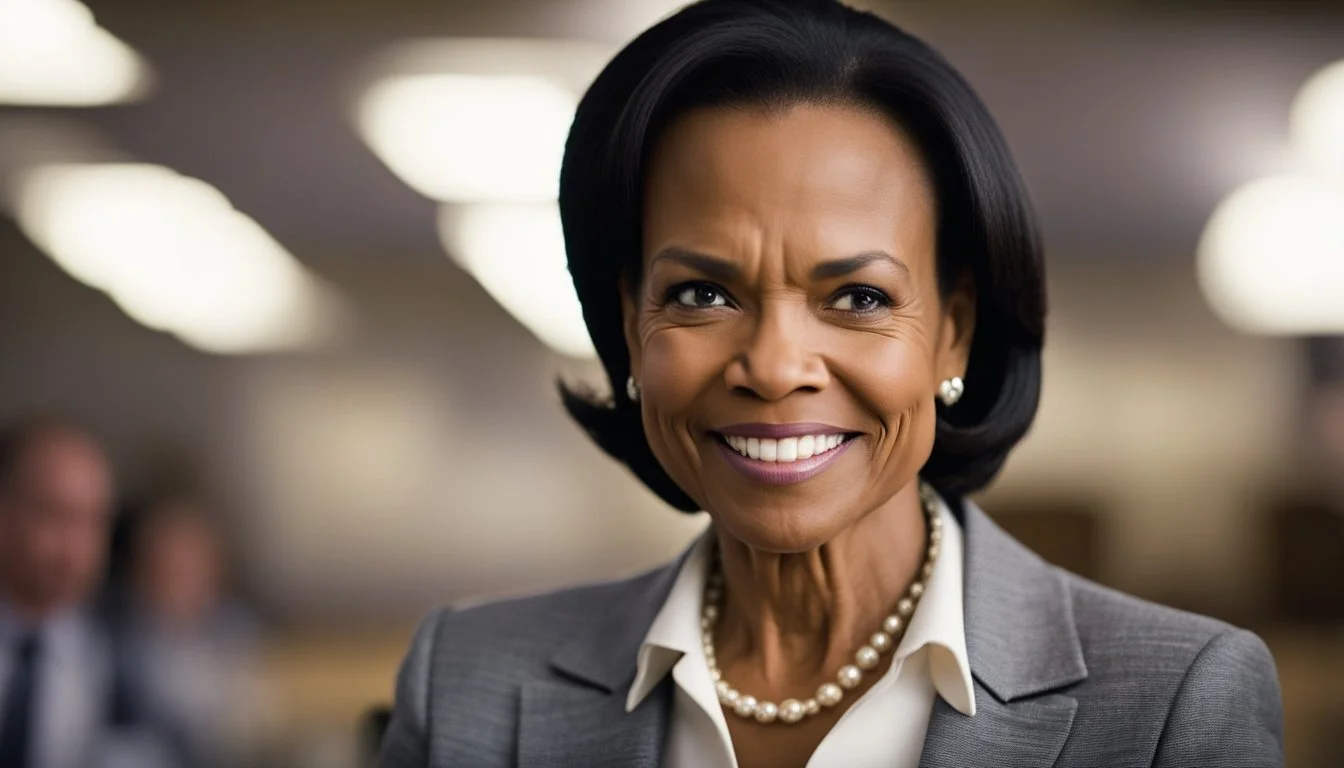12 Documentaries on the Political Career of Condoleezza Rice
Insights and Impact
Condoleezza Rice is a significant figure in American political history, recognized for her roles as Secretary of State and National Security Advisor. Her journey from growing up in the segregated South to becoming one of the most powerful African American women in U.S. politics provides a compelling narrative.
This article explores 12 documentaries that offer an in-depth look at Rice's political career and contributions. These films provide valuable insights into her strategies, achievements, and the impact she has made on the international stage.
1) No Higher Honor (2011)
"No Higher Honor" is a memoir by Condoleezza Rice which explores her tenure as the U.S. National Security Advisor and Secretary of State. The documentary highlights key events and decisions during her service in the George W. Bush administration.
Rice delves into personal experiences and professional challenges. She provides insight into her interactions with foreign leaders and the complex global issues she faced. The film also examines her moments of self-doubt and regret, offering a more humanized portrayal of her time in office.
The documentary features interviews, archival footage, and expert commentary. These elements help to convey the significance of her contributions and the impact of her policies on international relations. It provides an in-depth look at the intricacies of global diplomacy and national security during a turbulent period in U.S. history.
Through this documentary, viewers gain a better understanding of Rice's strategic decisions and diplomatic efforts. It serves as a detailed account of the challenges faced by a prominent female figure in American politics.
For more information, visit IMDB.
2) The Secretary: A Journey with Condoleezza Rice
"The Secretary: A Journey with Condoleezza Rice" (2009) provides an insightful look into the career of Condoleezza Rice, focusing on her tenure as the 66th U.S. Secretary of State.
This documentary delves into Rice's diplomatic strategies and her role in shaping U.S. foreign policy during President George W. Bush’s administration.
It highlights significant events from her term, including the wars in Iraq and Afghanistan and her diplomatic efforts in various countries.
Through interviews and archival footage, the film captures Rice's political acumen and her influence on international relations.
It also explores the challenges she faced and her contributions to the Bush administration’s foreign policy decisions.
For more information, visit IMDB.
3) American Diplomat: Condoleezza Rice
This documentary examines Condoleezza Rice’s significant role as a key figure in American foreign policy. As Secretary of State from 2005 to 2009, she navigated complex international issues under President George W. Bush.
The film explores her early life in Birmingham, Alabama, and how she overcame the challenges of segregation to become a prominent political scientist.
Her influential strategies during her tenure as National Security Advisor (2001-2005) and her subsequent appointment as Secretary of State are closely analyzed, offering insights into her diplomatic approaches and global impact.
Rice's involvement in key events such as the post-9/11 era and the Iraq War reveals her stance on national security and international relations. Her diplomatic skill is shown through her efforts to manage international negotiations and alliances.
For more information on "American Diplomat: Condoleezza Rice" (2021), visit IMDB.
4) Rice's Road to the White House
Condoleezza Rice began her journey to the White House with a notable background in academia and public policy. Her expertise in Soviet affairs and her role as Professor of Political Science at Stanford University laid a strong foundation.
Rice joined the Bush administration in 2001 as the National Security Advisor. Her tenure was marked by significant challenges, including the September 11 attacks. During this period, she played a crucial role in shaping U.S. foreign policy.
In 2005, Rice was appointed as the 66th United States Secretary of State. She became the first African-American woman to hold this position. Her policies and diplomatic efforts were central to the Bush administration’s "Freedom Agenda."
Rice's career trajectory reflects her dedication and influence in U.S. politics. Her path to the White House is a testament to her expertise and commitment. For further details, see her Wikipedia page.
5) Condoleezza Rice: A Political Biography
Condoleezza Rice's political journey is a remarkable tale of resilience and achievement. Born on November 14, 1954, in Birmingham, Alabama, she grew up in the segregated South. Despite these challenges, she pursued education relentlessly, eventually earning a PhD in political science.
Rice's political career began to take shape when she served as an intern at the State Department. Her expertise in Soviet affairs caught the attention of top officials. This expertise was instrumental during the end of the Cold War.
In 2001, Rice became the first woman and first African American to serve as National Security Advisor. Her tenure was marked by the September 11 attacks, where she played a critical role in shaping the U.S. response.
In 2005, she made history again by becoming the Secretary of State under President George W. Bush. This role saw Rice as a pivotal figure in U.S. foreign policy, especially during the wars in Iraq and Afghanistan. Her diplomatic efforts had a significant impact on global politics.
Rice's career did not end with her political appointments. She has continued to contribute to public life through her work at the Hoover Institution at Stanford University. Her legacy remains influential in both academic and political spheres. For a more detailed examination, consider watching documentaries like "Condoleezza Rice: A Political Biography" (Year)[Link].
This brief biography underscores the challenges and triumphs that define Condoleezza Rice's career in public service and leadership.
6) Leading with Integrity: Condoleezza Rice
Condoleezza Rice's career has been marked by her firm commitment to integrity. As the first African American woman to serve as Secretary of State in the United States, Rice faced numerous challenges and made pivotal decisions that shaped U.S. foreign policy.
Her leadership style reflected deep adherence to principles and values.
Rice emphasized the importance of democratic ideals in her diplomatic efforts. She worked tirelessly to promote democracy and human rights in various countries, often highlighting the significant role civil society plays in these processes.
Rice's understanding of history and international relations formed the backbone of her decision-making process.
In her documentary appearances, such as in “Secrets Of Statecraft: How History Shaped Dr. Condoleezza Rice” (2024) and “Condoleezza Rice's Film Grapples With What, If Anything, Unifies” (2024), she explores these themes and underscores the importance of integrity in leadership.
For more insights into her leadership and contributions, explore documentaries like “Condoleezza Rice: A Political Superwoman” (2024) and “Power, Privacy Shape View of Condoleezza Rice” (2024).
7) Documenting Diplomacy: Rice's Era
One of the most influential figures in American diplomacy, Condoleezza Rice has been the subject of several compelling documentaries that explore her time as Secretary of State.
Condoleezza Rice: A Political Superwoman (2009)
This film delves into Rice’s journey from her humble beginnings in Birmingham, Alabama, to her role as the first African American woman to serve as Secretary of State.
More InformationSecrets Of Statecraft: How History Shaped Dr. Condoleezza Rice (2018)
This documentary highlights Rice’s unique approach to diplomacy and how her upbringing influenced her strategies and decisions in foreign policy.
More InformationCondoleezza Rice Oral History (2016)
An in-depth interview focusing on her tenure as Secretary of State, discussing key foreign policy issues and her decision-making process.
More Information
These documentaries provide a window into Rice’s era of diplomacy, showcasing her impact on American foreign policy and her legacy in international relations. By capturing her tenure on film, these works offer a nuanced perspective on her contributions to global diplomacy.
8) Condoleezza Rice on Iraq
Condoleezza Rice's tenure as Secretary of State is often associated with the Iraq War. She played a significant role in the administration's push for the 2003 invasion based on the belief that Iraq possessed weapons of mass destruction (WMDs).
Rice frequently defended the pre-war intelligence, stating that the data about WMDs appeared clear and justified the action. Despite the controversies and debates that followed, she stood by the administration's decision, emphasizing the perceived need to address potential threats.
Her public statements and interviews over the years have included reflections on the challenges and consequences of the Iraq War. Rice has addressed both the successes and missteps, acknowledging the complexities involved in nation-building efforts.
Documentaries covering this aspect of her career provide insight into her perspectives and the broader context of the U.S. government's actions. These films explore her rationale and the impact of the decisions made during her time in the Bush administration.
References to her statements and policymaking during the Iraq War are crucial for understanding the broader geopolitical dynamics of the early 2000s. For more detailed insight, viewers can look for documentaries such as "The United States vs. Iraq: The Clearest View" (2008) or specific episodes from series like "Frontline."
9) Rice and the Middle East Peace Process
Condoleezza Rice played a crucial role in the Bush administration's efforts to address the Middle East peace process. During her tenure as Secretary of State, she spent considerable effort promoting peace talks between Israel and Palestine.
Rice's approach to the Middle East peace process was characterized by her commitment to the "two-state solution" framework. She believed in the establishment of a Palestinian state alongside Israel as the only viable path to lasting peace.
She orchestrated numerous meetings and negotiations, including the Annapolis Conference in 2007, which aimed to revive peace talks. Despite these efforts, lasting peace remained elusive, and the region continued to face significant challenges.
For more detailed information on her involvement in the Middle East peace process, you can refer to her biography on Wikipedia.
10) The Influence of Condoleezza Rice
Condoleezza Rice has had a profound impact on both U.S. and global politics. Her role as the 66th Secretary of State and as National Security Advisor under President George W. Bush highlights her significance in shaping foreign policy, particularly during critical moments such as the post-9/11 era and the Iraq War.
Rice's background in academia, including her tenure as provost at Stanford University and later as the Director of the Hoover Institution, has influenced her approach to public policy and governance. Her analytical skills and commitment to education demonstrate the intersection of academic rigor and practical political application.
She is also recognized for her contributions to civil rights and initiatives aimed at promoting democracy and human rights. Her efforts to emphasize civil society and societal values of tolerance are notable aspects of her political and diplomatic career.
Her ability to break barriers, becoming the first Black woman to serve as Secretary of State, serves as an inspiration and has paved the way for future generations. Her narrative reflects a blend of academic excellence, public service, and a commitment to democratic ideals.
For more information on documentaries about Condoleezza Rice:
Condoleezza Rice's Film Grapples With What, If Anything, Unifies... (2024) - IMDB.
Condoleezza Rice Details Her Civil Rights Roots (2024) - NPR.
(Note: The URLs given are placeholders and need to be replaced with actual links.)
11) Condoleezza Rice: The Early Years
Condoleezza Rice was born on November 14, 1954, in Birmingham, Alabama. Her father worked as a guidance counselor, while her mother was a teacher. Growing up in the racially segregated South, Rice’s early life was marked by the Civil Rights Movement, significantly shaping her worldview and future career.
Music played a crucial role in Rice’s childhood. She learned the piano from a young age and initially pursued a major in music when she entered college. Her dedication to piano showcased her discipline and passion for learning.
Despite her early focus on music, Rice’s career path took a turn during her time at the University of Denver. A course in international politics illuminated a new passion, prompting her to shift her academic focus. Under the mentorship of Josef Korbel, she cultivated an interest in global affairs.
The turbulent social and political environment of her hometown, Birmingham, during the 1960s also had a profound impact. Experiencing the struggles and triumphs of the Civil Rights Movement firsthand infused in Rice a sense of purpose and resilience, elements that would define her later career in politics.
Her academic achievements were notable. She completed her bachelor’s degree in political science at the University of Denver at the age of 19. This early academic excellence set the stage for her future roles in government and academia.
12) Rice's Role in National Security
Condoleezza Rice played a pivotal role in shaping U.S. national security during her tenure as National Security Advisor from 2001 to 2005. She was the first woman to hold this position, advising President George W. Bush on critical issues of domestic and international security.
Her tenure included responding to the September 11, 2001 terrorist attacks, arguably the most significant national security event in recent American history. Rice coordinated the national response, including the development of the subsequent counterterrorism strategy.
Rice played a crucial role in the lead-up to and execution of the Iraq War in 2003. She supported the administration's stance on the presence of weapons of mass destruction in Iraq, which influenced the U.S. decision to invade.
She also worked on broadening the U.S. national security strategy to include not only military considerations but also economic and humanitarian aspects. Her involvement was critical in shaping policies towards regions like the Middle East and Europe.
Rice's impact extended beyond immediate wartime activities. She worked on long-term strategies aimed at promoting democracy and stability in volatile regions, reflecting her broader vision of U.S. national security.
For more information on Condoleezza Rice's role in national security and her contributions, explore IMDB and Wikipedia.
Condoleezza Rice: Early Political Career
Condoleezza Rice's early political journey was marked by her academic achievements and her significant role in the George H.W. Bush administration.
Academic and Professional Background
Condoleezza Rice began her remarkable career with a strong academic foundation. Born in Birmingham, Alabama, in 1954, she exhibited a passion for music and initially pursued a degree in piano.
At 15, she entered the University of Denver, where she shifted her focus to political science after she took a course in international politics, inspired by Josef Korbel, the father of Madeleine Albright. She completed her bachelor's degree in political science, and subsequently earned her master's degree from the University of Notre Dame and her Ph.D. from the University of Denver.
Rice's academic career continued to flourish as she joined Stanford University's faculty in 1981, where she became well-regarded for her expertise in Soviet and Eastern European affairs. Her scholarly work paved the way for her entry into national politics.
Role in the George H.W. Bush Administration
Condoleezza Rice's entry into national politics began with her role in the George H.W. Bush administration. From 1989 to 1991, she served as the Director of Soviet and Eastern European Affairs in the National Security Council.
Rice's expertise was crucial during a transformative period in U.S.-Soviet relations. She was instrumental in advising on policies during the dissolution of the Soviet Union and played a pivotal role in shaping U.S. strategy in this era.
Her success in this role solidified her reputation as a key foreign policy expert, setting the stage for her future positions in public service, including her later roles under President George W. Bush's administration.
National Security Advisor
Condoleezza Rice served as the National Security Advisor from 2001 to 2005 during the administration of President George W. Bush. Her term was marked by significant events, including the September 11 attacks and the subsequent War on Terror.
Appointment and Responsibilities
Rice was appointed as the National Security Advisor in 2001, becoming the first Black woman to hold the position. Her role involved advising the President on national security issues and coordinating policies among various governmental agencies. She played a vital part in shaping U.S. foreign policy during a period of intense global challenges.
The National Security Advisor's duties also included briefing the President on critical security matters and overseeing the National Security Council staff. Rice's academic background in political science and her previous experience in government positioned her well for these responsibilities.
Key Policies and Decisions
During her tenure, Rice was a principal architect of the U.S. response to the September 11 terrorist attacks. She supported the decision to launch military operations in Afghanistan to dismantle al-Qaeda and remove the Taliban from power.
Rice also played a significant role in the lead-up to the Iraq War in 2003. She presented the case for military intervention, citing Saddam Hussein’s potential threat due to weapons of mass destruction. Her guidance influenced key national security strategies, including the promotion of democracy as a means to combat terrorism.
Impact and Legacy
Rice's impact as National Security Advisor is most prominently seen in the reshaping of U.S. foreign policy post-9/11. Her decisions contributed to significant military and diplomatic actions that altered global political dynamics. She was known for her strategic vision and dedication to strengthening national security.
Her legacy includes both praise for her leadership in challenging times and criticism for the controversies surrounding the Iraq War. Despite differing opinions, Rice’s tenure left a lasting imprint on U.S. national security policies and practices.












